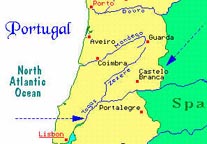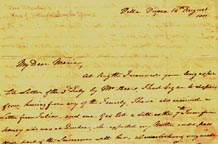These letters graciously have been shared with the Victorian Web by Eunice and Ron Shanahan; they have been taken from their website. The letters give an insight into the daily lives and concerns of 'ordinary' people without whom history would not exist. The letters are a wonderful example of how much history may be gleaned from such sources.
Click on the image for a larger view
I have two letters from officers in Wellington’s army, in action in the Iberian Peninsular War. They are both addressed to Mrs Bowes, the wife of General Foord Bowes. The first one is from her brother, dated at Villa Vicosa (Portugal), August 14, 1811 addressed simply to Mrs. Bowes, Gibraltar. The letter has no postal markings, so it was probably carried privately. Gibraltar at this time was a Naval Garrison. It had been ceded to Britain under the Treaty of Utrecht in 1713, after having been conquered in 1703/4. I wonder why Mrs Bowes was in Gibraltar: perhaps she and the General were there waiting for transport to Lisbon. The letter begins :
"My Dear Maria, At length I received your long expected letter of the 3rd July by Mr Deans."
Note: If this letter was also sent back by Mr Deans, perhaps this is why there were no postal markings.
I had begun to despair of ever hearing from any of the Family. I have also received a letter from Julia and one of as late a date as the 7th June from Nancy, who was at Quebec, she expected my Mother would pass some part of the summer with her - who was looking very well and young. My father also strong and well and all the Family. Robert was not satisfied with his Exchange, but that is always the case when too late."
Note: ‘Exchange’ in the military sense is to pass from one regiment or ship into another by exchange with another officer.
"William in the same way and anxious to get home. Colonel Delancy, with whom I dined when the Army was in camp near ELVAS told me that Susan was coming home - as Robert is quite re-established in his constitution I should like very much to hear that he was employed actively somewhere. Canada is a bad place to make an officer. God knows, I have many reasons to wish to be there, but as long as my Duty in the the profession I have chosen forbids it, I will not repine."
Note: Since the fall of Quebec, the British had kept a Military Garrison at Quebec which was engaged in action against the Americans in the Battle of 1812-1814. The letter then goes on to explain the movements of the Army.
"The greater part of the Army broke up very suddenly from their Cantonments [lodgings assigned to troops] and crossed Tagus as taking the route through Castello Branco and Sabugal, where the Headquarters were on 7th August.
 The
arrows show the river Tagus, which they had to cross, and Castelo Branca. Some
of the names referred to in these letters are shown - but not the smaller places.
The action took place round about where the arrowheads are pointing.
The
arrows show the river Tagus, which they had to cross, and Castelo Branca. Some
of the names referred to in these letters are shown - but not the smaller places.
The action took place round about where the arrowheads are pointing.
Map adapted from the Software Toolworks World Atlas CD-Rom.
Lord Wellington had some object in view when he commenced his secret and rapid March, but I have understood that it has failed and the Army is to go into Cantonments about Fundao and Belmonte, in the beginning of September, he intends besieging Rodrigo — I hope we shall see him here about the end of October, unless the French Army should form a junction in the north as they did last year under Massena, their own Corps of course, will unite with the rest of the Army, General Hill who joined us shortly after the Battle of Albuera, which has the same Corps of Observations which he had. It consists of three British Brigades of Infantry, one Division of Cavalry under Sir William Erskine, and a Portuguese Division under the General Hamilton. The 1st Battalion 28th joined on the 11th, I was happy to meet a number of my old friends.
We expected the 2nd Battalion would have been drafted with the 1st, but it is not to take place at present, to the great annoyance of some, who expected to get home. Col. Abercromby is happy to remain in the Country and had they been drafted, it would not have affected me, being on the Staff, I should have remained here, at all events. I belong to the 2nd Battalion yet. I allow two years more campaigning and fighting and then I hope to get leave to see my friends and relations.
I am sorry to think Lady Dundas has laid my letter before the Military Secretary, for the consideration of the Commander of the Forces - had I the least idea she would have done so, I certainly never should have troubled her Ladyship - Your earnest solicitations alone made me write the letter. I enclose you a letter I received three days ago from Col. Torrens, the usual official letter sent to all troublesome people."
Note : I wonder what this ‘usual letter’ from his Colonel contained - it would be interesting to know. The letter continues :
"From Julia’s letter it would appear all was not right - she complains that she does not hear of me so often from you, and her letter I think is not in her usual affectionate style — remember me to her and say I will write. I hope you will write a little oftener, remember me to the General, and believe me, ever my dear sister, your sincerely attached and most affectionate brother
James S. Johnson."
This letter was from Capt. James Stephen Johnson, aide-de-campe in the Peninsular War, and brother-in-law to General Foord Bowes. Johnson was one of those killed at the Battle of Badajoz, March 1812, so did not get back home to see his sister and the family.
As a historical note here about the siege of Badajoz, Wellington reported he had lost the flower of his army, and that if at the earlier siege at Cuidad Rodrigo, he had put the French Garrison to the sword for not surrendering as soon as practical breaches were made in the defences, he would have saved about 5,000 lives at Badajoz, as the French also refused to surrender at Badajoz after the defences had been breached.
One visitor to this page was John Hall, who provided further information about Captain Johnson's death. Mr Hall is the author of A History of the Peninsular War vol. VIII, The Biographical Dictionary of British Officers Killed and Wounded, 1808-1814 (Greenhill Books, 1998)." ISBN 1-85367-315-3. He wrote:
You might be interested in the following description of Captain Johnson's death: from Robert Blakeney, A Boy in the Peninsular War (London, 1899) p. 266:
6 April 1812, Badajoz:
"General Bowes ... being severely wounded, and his aide-de-camp, my old comrade and brother officer Captain Johnson, 28th Regiment, being killed, as I had no duty to perform (my regiment not being present), I attended the general as he was borne to his tent.
He enquired anxiously about poor Johnson, his relative, not being aware that this gallant officer received his death — shot while he was being carried to the rear in consequence of a wound which he had received when cheering on a column to one of the breeches."
Captain's commission, 28th Foot, 2 July 1807.
Also, he is mentioned in the obituary of Major-General Foord Bowes in The Gentleman's Magazine, Oct. 1812, p. 403 ["At the storming of Badajoz he ... had his aide-de-camp, Capt. Johnson, killed by his side."]
Follow this link to the next letter to Mrs Bowes, this time from her husband, General Foord Bowes.
Last modified 22 August 2024
